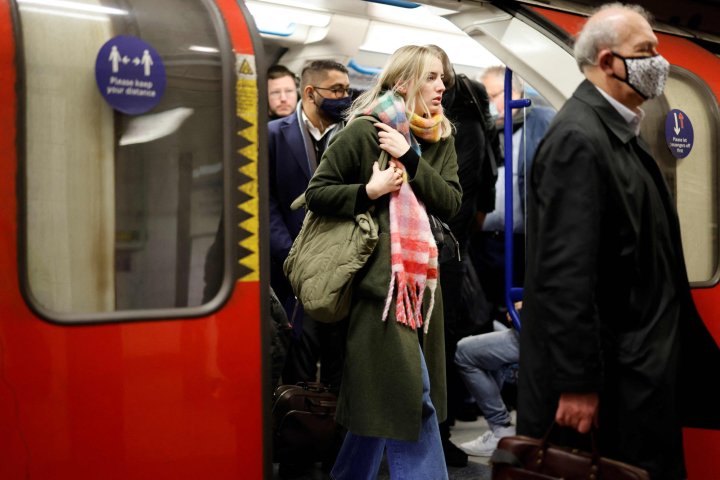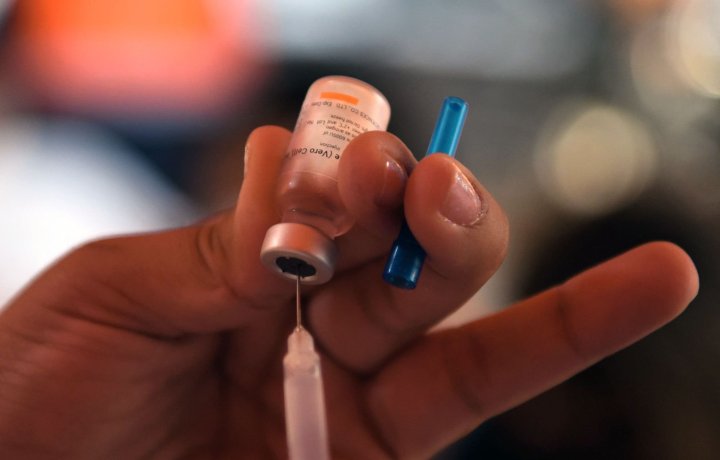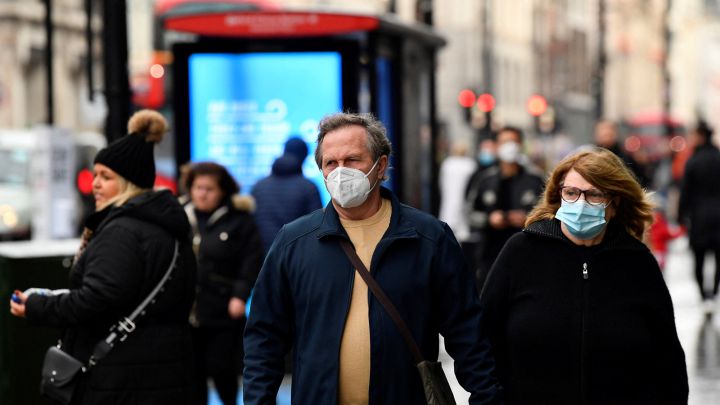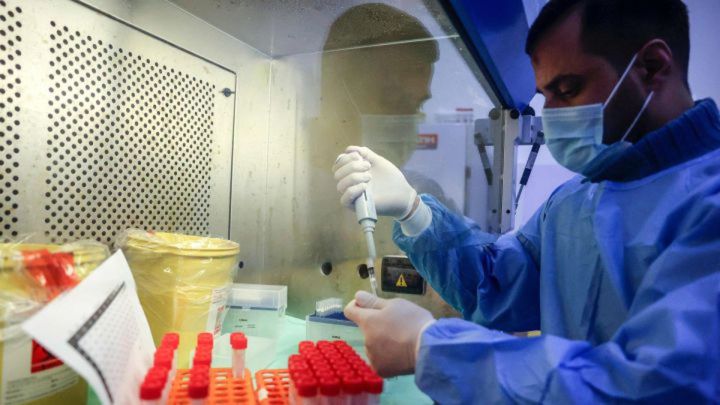Covid news summary: 4 February 2022

Covid news: all the latest updates
Covid-19 Omicron variant headlines:
- Rising Omicron cases and worker shortage impacting on job hires
- Scientistsin New York City find "cryptic variant" in sewage water
- Department of Defense announces that it will begin todischarge military members who have not been vaccinated.
- Pfizer seeks emergency use authorisation for vaccine for children under five
- Moderna vaccine has received full FDA authorisation
General news and information
- US residents can get free at-home covid-19 tests on website covidtests.gov (tel: 1-800-232-0233)
- How long after having covid do you have to wait to get booster?
- How infectious is the BA.2 subvariant of the Omicron strain?
- Who may not need a fourth covid-19 vaccine dose?
- Omicron may carry increased risk of long covid
- Is it normal to experience armpit pain after being vaccinated?
Key websites:
- The Centers for Disease Control and Prevention
Further covid-related reading:
White House repsonds to questions over federal test distribution program
Q Okay. Do you have any updates on the testing efforts — the shipping out of the free COVID tests? How many have there been shipped out now? Do you have an update on that? Are they still being shipped out every 7 to 12 days from the order?
MS. PSAKI: So, I don’t have an update on numbers. It’s changing constantly. I know we confirmed — I think it was last Friday, so I’m sure it’s changed since then — that we had about 60 million orders. And we had sent out tens of millions of tests. And you’ve certainly seen on social media people receiving their tests, which is always good news. But I don’t have — I don’t have an update on that.
And this program, of course, is just beginning to ramp up. We’d said at the beginning we wouldn’t start sending tests until the end of January. We obviously did it ahead of time.
But what we’re really relying on right now is as soon as testing manufacturers deliver tests to the U.S. government, we will get them out to the American people. And the Postal Service is doing their job packing and shipping efficiently. And I expect we’ll have more updates in due time — a short time, I hope.
Omicron cases drop sharply in the United States
ABC News provides the latest update on the pandemic yesterday and the latest data shows that cases are down across the country.
Similtanoiusly many parents are holding protests calling on their child's school or district to lift their mask mandates. The newly sworn in GOvenor of Virignia, Glenn Youngkin singed an order saying that parents could opt their child out of wearning a mask. However, several school distrcts have continued to suspend students for not wearing masks, going against the orgder.
With cases down across the country, many protests are taking place urging school districts to drop mask mandates. School districts have suspended students, going against a direct order from the Governor of Virginia.
Merck sees 2022 sales up nearly 20%, mostly on new covid pill
Merck & Co stated that it expects its 2022 sales to increase as much as 18 percent over last year, mostly on sales of its new covid-19 pill, molnupiravir.
The drugmaker said sales of the covid19 drug were $952 million in the fourth quarter, and it expects another $5 billion to $6 billion in molnupiravir sales in 2022.
Merck developed the antiviral pill - and shares the profits equally - with Ridgeback Biotherapeutics. Merck Chief Financial Officer Caroline Litchfield said in an interview it is possible molnupiravir sales could top those estimates, which are based on already signed supply agreements for around 10 million treatment courses of the drug.
Turkey logs record 111,157 covid-19 cases in 24 hours
Turkey recorded 111,157 new covid-19 infections in the last 24 hours, its highest daily figure of the pandemic, while the daily death toll was its highest in four months, health ministry data showed on Friday.
In late December, daily cases stood at about 20,000 but have since surged due to the highly transmissible Omicron variant of the coronavirus.
Friday's data also showed 248 people died due to covid-19 in the same 24-hour period, the highest daily toll since Oct. 4 when there were also 248 deaths.
Greece to scrap negative covid test demand for travellers
Greece will allow tourists with a European vaccination certificate to enter the country without having to show a negative test for COVID-19 from Feb. 7, the tourism and health ministries said on Friday. The Mediterranean country, which relies heavily on tourism, has been gradually easing travel restrictions initially imposed to combat the spread of covid-19.

Austrian covid vaccine mandate to come into force on Saturday
An Austrian law making it compulsory for adults to get vaccinated against coronavirus, the European Union's first such sweeping covid-19 vaccine mandate, was promulgated on Friday and will go into force on Saturday.
Austria's upper house of parliament passed the bill on Thursday by a large margin. It was officially published on Friday afternoon after being signed into law by President Alexander Van der Bellen and Chancellor Karl Nehammer, meaning it will take effect the next day.
Roughly 69% of Austria's population is fully vaccinated against covid-19, one of the lowest rates in western Europe, which the conservative-led government says justifies the measure and its fines of up to 3,600 euros ($4,109) for breaches.

Italy reports 99,522 coronavirus cases on Friday, 433 deaths
Italy reported 99,522 Covid-19 related cases on Friday, against 112,691 the day before, the health ministry said, while the number of deaths rose to 433 from 414.
Italy has registered 148,167 deaths linked to Covid-19 since its outbreak emerged in February 2020, the second-highest toll in Europe after Britain and the ninth highest in the world. The country has reported 11.45 million cases to date. Patients in hospital with Covid-19 - not including those in intensive care - stood at 19,000 on Friday, down from 19,324 a day earlier.
There were 114 new admissions to intensive care units, up from 95 on Thursday. The total number of intensive care patients fell to 1,440 from a previous 1,457. Some 884,893 tests for Covid-19 were carried out in the past day, compared with a previous 915,337, the health ministry said.

UK pandemic modellers warn of possible future large waves of Covid-19 infection
There is a realistic possibility of large waves of Covid-19 infection in the future in Britain and such waves might even be considered likely, epidemiologists who model the Covid-19 pandemic to inform government advice have said.
British Prime Minister Boris Johnson has ditched legal restrictions in England, saying that, while the pandemic was not over, Britain needs to learn to live with Covid. The Scientific Pandemic Influenza Group on Modelling, Operational sub-group (SPI-M-O) said the emergence of new viral variants was the biggest unknown factor in the medium-to-long term, along with waning population immunity and changes in mixing patterns.
"Large future waves of infection that need active management to prevent detrimental pressure on the health and care sector are, at least, a realistic possibility (high confidence) or likely (medium confidence)," SPI-M-O said in a consensus statement published on Friday.
England returned to Plan A last week, and the chair of SPI-M-O told Reuters that while each year should see the Covid situation improve, there may be times where the government has to go backwards and introduce measures. "The next few years will be highly uncertain, and future outbreaks and waves will likely be noisy as things settle down," the SPI-M-O statement said. "A steady, predictable pattern... may be many years away."
Spain to scrap mandatory outdoor masks
Spain will lift a requirement for people to wear masks outdoors as a measure against the coronavirus, extending a wider rollback of restrictions as the contagion slowly recedes in the country. The cabinet plans to approve an end to mandatory outdoor mask wearing at its weekly meeting on Tuesday and make it effective two days later, Health Minister Carolina Darias told Cadena SER radio station on Friday.
Mask wearing outdoors was reinstated in late December to curb the spread of the emergent Omicron variant of the coronavirus. "We said it would last only while it was strictly necessary," Darias said. As contagion rates and other indicators have fallen for several days, the government considers the Covid-19 situation to have eased, she said. Spain follows several other European countries that have begun to roll back Covid-related restrictions. Outdoor masks are no longer compulsory in France and Italy announced on Wednesday it would release a timetable for a phase-out of restrictions. Regional authorities in Spain's Northern Aragon and Basque Country regions as well as in the Canary Islands have also lifted some restrictions on socialising. Aragon dropped a rule requiring a Covid vaccination or PCR test certificate to access bars and restaurants and scrapped all restrictions on opening hours and capacity. The Basque Country stopped requiring the pass and Canary Islands now permits bars and restaurants to ask for it on voluntary basis. Catalonia, Spain's second largest region, scrapped the Covid pass requirement a week ago.
Over the past two weeks, the Covid-19 contagion rate in Spain has steadily fallen, reaching 2,421 cases per 100,000 people on Thursday, down from almost 3,400 in early January. Despite the surge in cases between November and January as Omicron spread, hospital admissions and deaths remain well below those seen in earlier waves of the pandemic. This is thanks largely to Spain's high vaccination rate and Omicron's apparent tendency to cause less serious illness than previous variants.
Spain's total death toll from the pandemic stands at 94,040 and the number of cases at 10.2 million.
Italian anti-vax priest dies after Covid-19 battle
An Italian priest who refused to get vaccinated as he believed that the jab contained cells from aborted embryos has lost his battle with Covid-19. He was 51. Don Paolo Romeo, parish priest at Santo Stefano in Genoa, contracted Covid-19 last month and was admitted to Galliera hospital, L’Unione Sarda reports.
Omicron surge and worker shortage likely hurt hiring
Last month’s huge wave of Omicron infections is thought to have weakened hiring in January, though the pullback is considered all but sure to prove a temporary one.
Economists have forecast that the Labor Department will report that employers added just 170,000 jobs last month, according to data provider FactSet. They expect the unemployment rate to remain unchanged at 3.9%.
If the forecast is accurate, January would mark the lowest monthly job gain in about a year.
Race to send vaccines and aid as covid reaches Pacific islands
Pacific island nations that are some of the last places in the world to be hit by the coronavirus pandemic are recording a growing number of covid-19 cases, prompting a rush to provide vaccines, medical teams and food aid.
Concern about the detection of the coronavirus in tsunami-hit Tonga, where one new case was recorded today, has been heightened by thousands of infections sweeping neighbouring Pacific islands.
In the Solomon Islands, where riots, not connected to the pandemic, saw buildings in the capital, Honiara, burn in November, an outbreak of the Delta strain with 2,357 cases has overwhelmed the health system, aid agencies say.
Vaccine debate hurting many
As well as the millions of people that have died or been severely unwell without vaccinations, there have also been indirect damages felt elsewhere.
US hospitals said to be on 'survival mode'
60 Minutes sat down with nurses across the country who describe what it is like in a hospital overun by covid-19.
In January scientists in New York City examining sewage water samples to track the levels of covid-19 virus found something they did not expect. The New York Times has reported that this group has identified a viral fragment with various mutations that cannot be linked to any of the known variants captured in human patients.
Microbiologists at Queensborough Community College, who identified the fragment, published a paper in Nature on Thursday 3 February, detailing possible hypothesis as to its origins.
Covid cases fall sharply in the United States
As covid case fall by up to 36% in a week, some hospitals are still struggling to deal with admissions.
ABC bring an overview of the current situation, including the US army's big call.
White House update
The current seven-day daily average of cases is about 446,400 cases per day, a decrease of about 36 percent over the previous week.
The seven-day average of hospital admissions is about 17,100 per day, also a decrease of about 14 percent over the previous week.
And the seven-day average daily deaths are about 2,300 per day, which is an increase of about 4 percent over the prior week.
Despite the global dominance of the original Omicron variant, BA.1, another pothole in the covid-19 highway has appeared, BA.2. The cousin of the former, BA.2 has begun to take a hold in countries around Europe, especially Denmark. Scientists have begun to test the new subvariant to assess its dangers, and have returned important findings.
Like with Omicron BA.1, the subvariant is extremely transmissible. However, BA.2 is a step above that, with estimates by the Danish health authorities that it is a further 50 percent more transmissible than BA.1.
Africa must speed up vaccinations - WHO
Africa needs to speed up vaccinations six-fold if it hopes to beat the Covid-19 pandemic, and people on the continent should not become complacent because of reports Omicron is milder than previous variants, the WHO's Africa director said on Thursday.
Only 11% of Africans are fully vaccinated, lagging most of the rest of the world. The World Health Organization's Matshidiso Moeti said around 6 million Africans were being vaccinated per week, but "that number needs to increase exponentially to 36 million a week to put countries on the path to beating this pandemic." She said she was worried that reports that the Omicron variant was milder than earlier strains of the virus would undermine vaccine programmes. "I think we are already seeing signs that people's understanding is that this virus is spreading very fast but it is not very lethal and therefore some people will feel 'why, why bother?'" she said.
Health experts say that although Omicron can be milder than other coronavirus variants, it can still cause serious illness and death. Vaccines sharply reduce those risks, saving lives and protecting healthcare systems from becoming overwhelmed. The African Union has launched a campaign urging young Africans in particular to come forward for vaccination. Other organisations such as the WHO and UNICEF are also working to make vaccination easier for Africans.
In South Africa, where a huge wave of Omicron cases has subsided after peaking late last year, the government has scrapped isolation rules for people who test positive but display no symptoms. At a separate briefing, the Africa Centres for Disease Control and Prevention Director Dr John Nkengasong cautioned countries against going too far in relaxing restrictions because of a perception that Covid-19 was now endemic. "With (an) 11% positivity rate and the severity of what we are seeing now, that is the waves that keep coming and going ... it doesn't meet the definition of endemicity," he said.
Denmark's covid-19 tally could be twice as high as registered
The number of adult Danes infected with Covid-19 may be double the official tally, Danish scientists said on Thursday, after releasing data suggesting one third of the adult population has been infected in the past three months.
By screening blood donations for certain antibodies, Danish scientists say they have come closer to determining how many people are actually infected, following the emergence of the more infectious Omicron variant. The preliminary research, conducted by the Nordic country's top infectious disease authority, Statens Serum Institut (SSI), was based on analysis of 4,722 blood donations collected in mid-January. The blood was analysed to see whether it contained antibodies against the virus' so-called nucleocapsid protein. This type of antibody is only created when the body encounters the real coronavirus. It would not figure in blood samples from persons, who had never been infected, even though they have developed antibodies from vaccines.
"The results indicate that... the proportion of infected people who have not tested positive makes up between a third and a half of all infections," SSI director Henrik Ullum said in a statement. That means that for every 100 coronavirus infections registered, another 100 infections could go unreported.
According to official numbers, 1.2 million infections have been registered since 1 November, around a fifth of the population. But that number includes children's infections and reinfections. SSI's preliminary findings, which it says are subject to some uncertainty, could help authorities better predict the trajectory of the epidemic and shed light on population immunity, it said.

Omicron BA.2: what to know about the covid sub-variant
The highly transmissible Omicron variant now accounts for half of the world's infections. But Omicron is an umbrella term for several closely related lineages of the SARS-CoV-2 coronavirus, the most common of which is the BA.1 lineage.
Now more countries, particularly in Asia and Europe, are reporting an increase in cases driven by BA.2. While it appears to be more transmissible than previous variants, there is no data yet to suggest that it is any more severe.
The BBC have put together a solid summary which should answer your questions.
Covid live blog: welcome
Good morning and welcome to our daily live blog on Friday 4 February 2022, covering everything related to covid-19. We'll be covering the spread of the highly contagious strain Omicron and associated news with a particular focus on the United States.
According to the US Centers for Disease Control and Prevention's most recent figures, the country's daily rate of cases and deaths stands at just under 677,000 and 2,600, respectively.
As of the end of January, 99.9% of all new cases in the US were the Omicron variant, the CDC said.
Stay with us and stay informed.
- Pharmaceutical industry
- Vaccines
- United States
- Medical personnel
- Medical treatment
- Pharmacy
- Pandemic
- Coronavirus
- Hospitals
- Virology
- Joseph Biden
- Outbreak
- Infectious diseases
- Vaccination
- North America
- Microbiology
- Diseases
- Medicine
- America
- Enterprises
- Anthony Fauci
- Health service
- Biology
- Health
- Industry
- Life sciences
- Nurses
- Moderna
- Pfizer
- Infirmary
- Science
- Coronavirus Covid-19
- Doctors
- Healthcare











